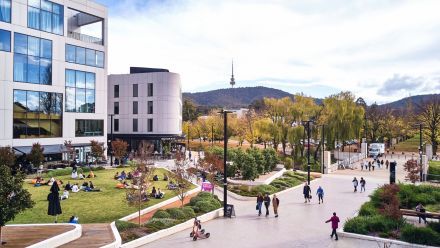Vale Gough Whitlam
Former Prime Minister Gough Whitlam, who has died at 98, held long and enduring links with the Australian ¾«¶«“«Ć½app University.
Mr Whitlam and his wife Margaret lived at University House for six months after the dismissal in 1975, when he found himself suddenly forced out of The Lodge.
He became an Honorary Fellow of University House in 1982.
In October 1975, at the height of political crisis that culminated in his dismissal on 11 November, Mr Whitlam gave a at the ANU. His topic was Government of the people, for the people, by the people.
In his life after politics, Mr Whitlam was a foundation member and Visiting Fellow in the Department of Political and Social Change from 1978 to 1980.
Fellow founding member, now Emeritus Fellow Ronald J May, wrote of Whitlamās time at the department in The Coombs: A House of Memories.
āWhitlam was an active and collegial scholar (provided one didnāt mention East Timor) and a regular visitor to the Coombs tea room. He took special delight in serving for a few days as acting head of department,ā May wrote.
In 1981 he became the first ¾«¶«“«Ć½app Fellow based at the ANU Research School of Pacific Studies.
He remained a frequent visitor to the ANU, giving speeches and launching books, including a visit to the North Australian Research Unit at the Northern Territory campus in 1994.
But his ties with ANU go back much further.
The Whitlam family connections with the ANU stretch back to the old Canberra University College (CUC), which merged with the ANU in 1960.
Mr Whitlamās father Fred Whitlam was the Commonwealth Crown Solicitor and a lecturer in commercial law at the CUC. He also served on its council from 1939-1941. In the 1950s Fred was also a member of the committee of legal advisers at ANU.
As an MP, Gough Whitlam regularly attended events at the ANU. In 1961, as Deputy Labor Party leader, he attended the laying of foundation stone ceremony for .
Mr Whitlam became Prime Minister in December 1972, ending Laborās 23 years in opposition.
His government was credited with sweeping social and political reforms, including the introduction of universal health care, free education, and building closer ties with China.
But his government ran into a constitutional crisis in 1975, when a hostile Senate blocked supply, prompting then Governor-General Sir John Kerr to intervene and dismiss the government.
Images of Whitlamās time at ANU can be viewed at .


